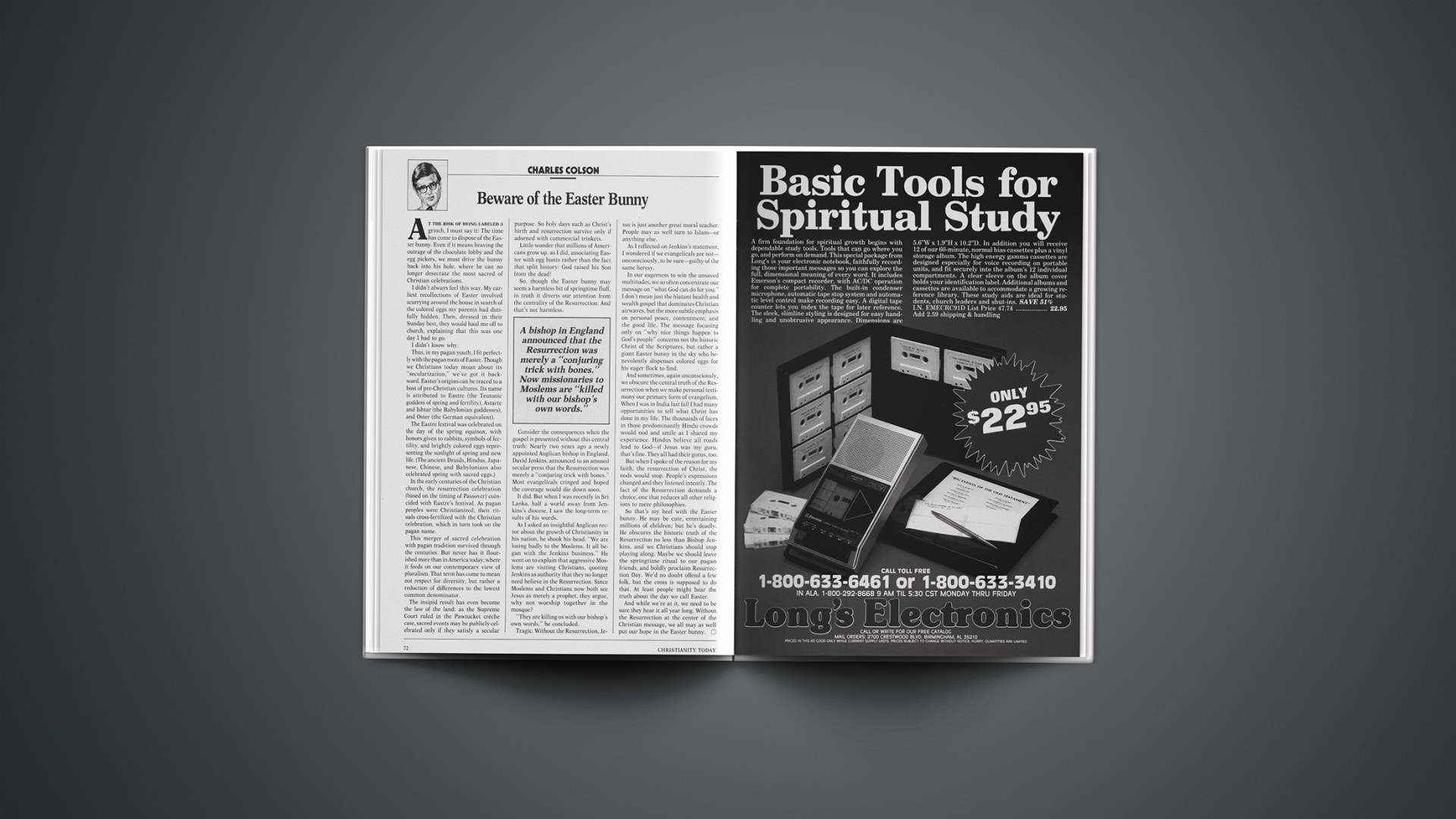At the risk of being labeled a grinch, I must say it: The time has come to dispose of the Easter bunny. Even if it means braving the outrage of the chocolate lobby and the egg pickers, we must drive the bunny back into his hole, where he can no longer desecrate the most sacred of Christian celebrations.
I didn’t always feel this way. My earliest recollections of Easter involved scurrying around the house in search of the colored eggs my parents had dutifully hidden. Then, dressed in their Sunday best, they would haul me off to church, explaining that this was one day I had to go.
I didn’t know why.
Thus, in my pagan youth, I fit perfectly with the pagan roots of Easter. Though we Christians today moan about its “secularization,” we’ve got it backward. Easter’s origins can be traced to a host of pre-Christian cultures. Its name is attributed to Eastre (the Teutonic goddess of spring and fertility), Astarte and Ishtar (the Babylonian goddesses), and Oster (the German equivalent).
The Eastre festival was celebrated on the day of the spring equinox, with honors given to rabbits, symbols of fertility, and brightly colored eggs representing the sunlight of spring and new life. (The ancient Druids, Hindus, Japanese, Chinese, and Babylonians also celebrated spring with sacred eggs.)
In the early centuries of the Christian church, the resurrection celebration (based on the timing of Passover) coincided with Eastre’s festival. As pagan peoples were Christianized, their rituals cross-fertilized with the Christian celebration, which in turn took on the pagan name.
This merger of sacred celebration with pagan tradition survived through the centuries. But never has it flourished more than in America today, where it feeds on our contemporary view of pluralism. That term has come to mean not respect for diversity, but rather a reduction of differences to the lowest common denominator.
The insipid result has even become the law of the land: as the Supreme Court ruled in the Pawtucket créche case, sacred events may be publicly celebrated only if they satisfy a secular purpose. So holy days such as Christ’s birth and resurrection survive only if adorned with commercial trinkets.
Little wonder that millions of Americans grow up, as I did, associating Easter with egg hunts rather than the fact that split history: God raised his Son from the dead!
So, though the Easter bunny may seem a harmless bit of springtime fluff, in truth it diverts our attention from the centrality of the Resurrection. And that’s not harmless.
Consider the consequences when the gospel is presented without this central truth: Nearly two years ago a newly appointed Anglican bishop in England, David Jenkins, announced to an amused secular press that the Resurrection was merely a “conjuring trick with bones.” Most evangelicals cringed and hoped the coverage would die down soon.
It did. But when I was recently in Sri Lanka, half a world away from Jenkins’s diocese, I saw the long-term results of his words.
As I asked an insightful Anglican rector about the growth of Christianity in his nation, he shook his head. “We are losing badly to the Moslems. It all began with the Jenkins business.” He went on to explain that aggressive Moslems are visiting Christians, quoting Jenkins as authority that they no longer need believe in the Resurrection. Since Moslems and Christians now both see Jesus as merely a prophet, they argue, why not worship together in the mosque?
“They are killing us with our bishop’s own words,” he concluded.
Tragic. Without the Resurrection, Jesus is just another great moral teacher. People may as well turn to Islam—or anything else.
As I reflected on Jenkins’s statement, I wondered if we evangelicals are not—unconsciously, to be sure—guilty of the same heresy.
In our eagerness to win the unsaved multitudes, we so often concentrate our message on “what God can do for you.” I don’t mean just the blatant health and wealth gospel that dominates Christian airwaves, but the more subtle emphasis on personal peace, contentment, and the good life. The message focusing only on “why nice things happen to God’s people” concerns not the historic Christ of the Scriptures, but rather a giant Easter bunny in the sky who benevolently dispenses colored eggs for his eager flock to find.
And sometimes, again unconsciously, we obscure the central truth of the Resurrection when we make personal testimony our primary form of evangelism. When I was in India last fall I had many opportunities to tell what Christ has done in my life. The thousands of faces in those predominantly Hindu crowds would nod and smile as I shared my experience. Hindus believe all roads lead to God—if Jesus was my guru, that’s fine. They all had their gurus, too.
But when I spoke of the reason for my faith, the resurrection of Christ, the nods would stop. People’s expressions changed and they listened intently. The fact of the Resurrection demands a choice, one that reduces all other religions to mere philosophies.
So that’s my beef with the Easter bunny. He may be cute, entertaining millions of children; but he’s deadly. He obscures the historic truth of the Resurrection no less than Bishop Jenkins, and we Christians should stop playing along. Maybe we should leave the springtime ritual to our pagan friends, and boldly proclaim Resurrection Day. We’d no doubt offend a few folk, but the cross is supposed to do that. At least people might hear the truth about the day we call Easter.
And while we’re at it, we need to be sure they hear it all year long. Without the Resurrection at the center of the Christian message, we all may as well put our hope in the Easter bunny.










